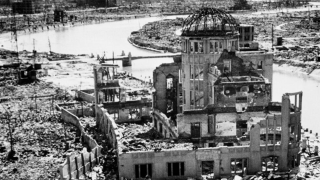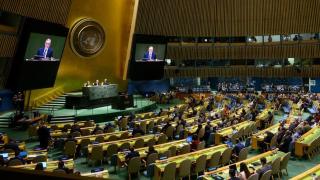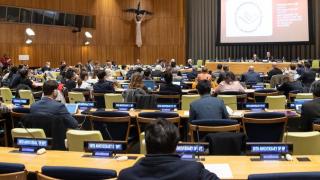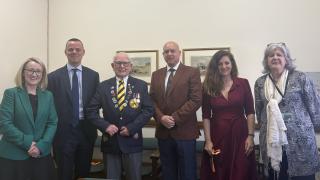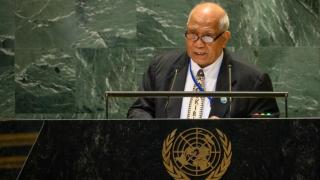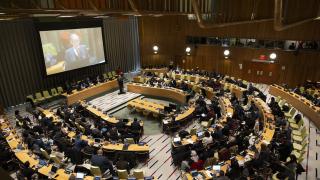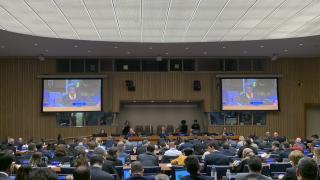
On 28 October, the General Assembly voted with an overwhelming majority in favour of a resolution entitled ‘Addressing the legacy of nuclear weapons: providing victim assistance and environmental remediation to Member States affected by the use or testing of nuclear weapons’.
The UK’s vote puts it at odds with almost all NATO countries, who voted in favour (excepting the USA, who abstained, and France, who voted against), and together with just three other states, including North Korea and Russia. The resolution was tabled by Kiribati and Kazakhstan.
The initiative is the first ever General Assembly resolution aimed at practical measures to address the harms from past nuclear use and testing and constitutes a significant global endorsement for a programme of work led by Kiribati and Kazakhstan, under the auspices of the Treaty on the Prohibition of Nuclear Weapons (TPNW).
Kiribati and Kazakhstan are linked through their shared experiences as nations devastated by nuclear testing as well as their status as States Parties to the TPNW. They lead the TPNW’s working group on victim assistance, environmental remediation and international cooperation and assistance (Articles 6 and 7 of the Treaty) - the first multilateral legal framework to address the harms from past nuclear use and testing.
The UK’s vote raises serious questions around accountability and justice given the UK’s role as a nuclear armed state which has undertaken 98 nuclear weapon tests, including nine detonations in Kiribati and the facilitation of a further 24 US tests on that territory between 1957 and 1962 while the territory was under British colonial control.
The physical and mental health effects and social, economic, and cultural impacts of nuclear testing in Kiribati persist to this day, not only for those directly affected, but for the descendants of those affected by ionising radiation and other aspects of the testing programme (such as forced displacement of populations and lack of access to lands). The health issues associated with radiation exposure among indigenous populations - as well as nuclear test veterans - caused by the UK’s tests have been inadequately assessed and disregarded by successive UK governments.
In its explanation of the vote, the UK said it had voted against the resolution as it did not reflect the UK’s position on the legacy of its nuclear tests. It voted specifically against paragraphs that: recognised that the consequences of nuclear testing cross borders; acknowledged the trauma caused by nuclear testing as well as the physical health impacts; and deplored the suffering of those affected. It also erroneously suggested that the resolution may undermine the Comprehensive Test Ban Treaty (CTBT) - given that the CTBT does not respond to nuclear legacies, such measures could only be complementary to it. The UK Government should clarify its statement with respect to this vote.
The forthcoming Meeting of States Parties of the TPNW provides an opportunity for the UK to attend as a non-signatory observer in order to listen and learn about this programme of work and respond to concerns raised. We will be writing to the UK to ask the Government to take this important step. The UK must also respond to the calls from Kiribati for compensation as well as participation in information exchanges to enable them to assess and remediate the harm caused by the UK’s actions on their territory.
Read more:
- Read UNA-UK and Article 36’s briefing on addressing British nuclear testing in Kiribati
- Read Dr Becky Alexis-Martin’s latest blog for UNA-UK on nuclear testing
- Read Dr Becky Alexis-Martin in the Telegraph: Veterans join Pacific Islanders in bid for nuclear testing compensation
- Read UNA-UK’s update from NPT PrepCon
- Read the Joint Statement on behalf of Kiribati and Kazakhstan at the 2023 NPT Preparatory Committee General Debate
- Read Kiribati and Kazakhstan’s resolution from the 78th UNGA Session
Photo: On 28 October UN member states passing resolution “Addressing the legacy of nuclear weapons: providing victim assistance and environmental remediation to Member States affected by the use or testing of nuclear weapons.". Credit: Nuclear Age Peace Foundation via Twitter.

